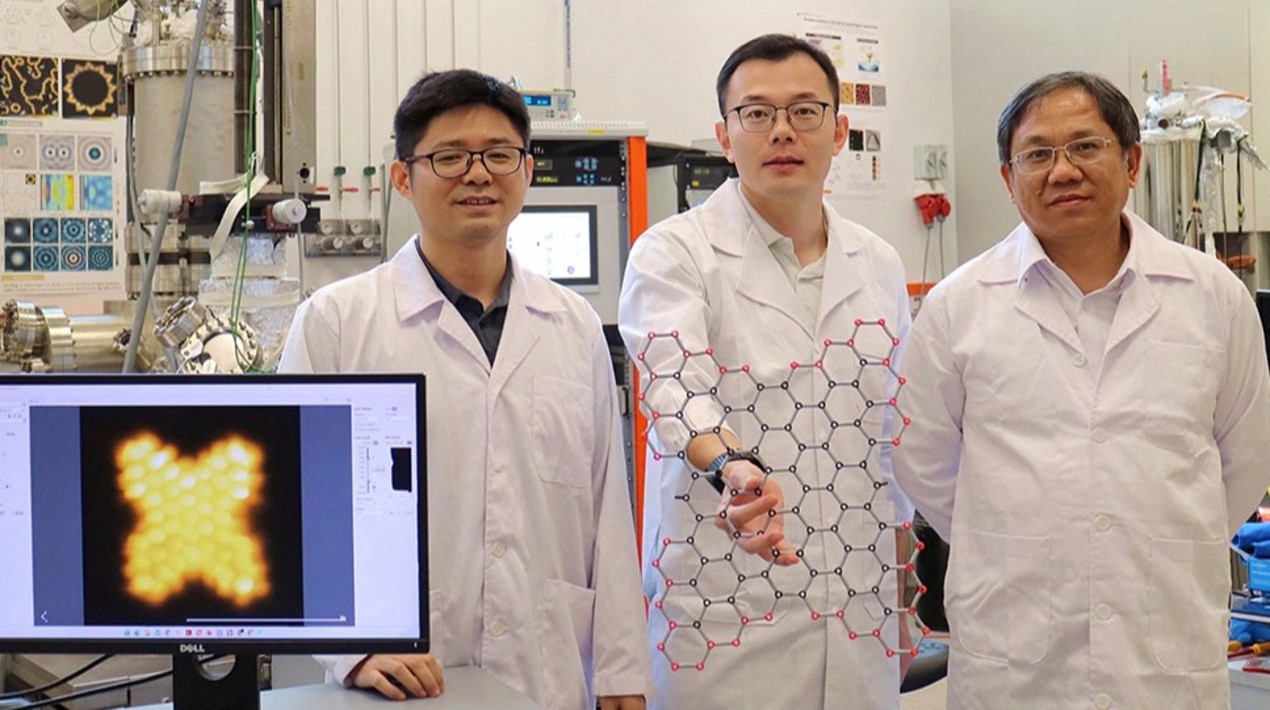
Above photo (from left): Mr. Goh Chee Kiong (EDB) & Mr. Tommy Leong (SE). Photo credit: Dean Koh
Tell us more about your role as Executive Director, Cleantech & Cities at EDB Singapore.
Mr. Goh: EDB is the lead government agency responsible for planning and executing strategies to enhance Singapore’s standing as a global business centre and to grow the Singapore economy. We also play a major role in making sure that we create value for companies in Singapore and provide a pro-business environment for them to operate in. The supported companies include MNCs such as SE as well as our local enterprises. The way EDB is structured is that we specialise in a number of industry verticals, and in particular I look after Clean Technology as well as Smart Cities.
Could you share some of the major projects/initiatives that are under your care currently?
Mr. Goh: Let me start off by painting the bigger picture. Of course you are familiar with the Smart Nation initiative by the Singapore government. I will first point out that the heart of our Smart Nation initiative is our desire to improve the lives of Singaporeans. So it’s beyond just adopting technologies per se. We all know that Singapore has big aspirations to be a leading smart, sustainable and liveable city in Asia. At the same time, we also have a strong interest to be a leading innovator and exporter of urban solutions for this region and beyond.
So in a nutshell, Singapore as a small city-state with no natural resources, will face a lot of challenges and we would like to turn these challenges into opportunities for companies in Singapore. Singapore, in our view, is widely regarded as a living laboratory today. It means that companies will find it convenient to develop, test and commercialise innovative urban solutions in a real life setting before they scale up for the region and beyond. I am happy to share a few examples related to what SE is doing in Singapore. In the broad spectrum of smart and sustainable cities, we are looking at a few key domains – one of which is energy. In the energy domain, EDB is supporting SE to build up microgrid and energy management capabilities in Singapore. In fact, Singapore has launched what is known as the REIDS – Renewable Energy Integration Demonstrator at Singapore. It is a microgid platform on one of our islands, known as Semakau, where we’re testing hybrid energy solutions ranging from solar to wind to tidal and more importantly, to integrate all these energy systems in the most efficient manner.

Above photo: Southeast Asia’s first demonstration micro-grid that will integrate multiple renewable energy sources.
Photo credit: Nanyang Technological University
SE is one of our key innovation partners in REIDS. Their interest is to see whether they can export this know-how to the immediate region because Southeast Asia has many islands and communities where power is not very stable. In the Building domain, Singapore has articulated a very ambitious roadmap to have 80% of all our buildings to be certified as green buildings by 2030. As part of this green building push, the Building & Construction Authority (BCA) has also said that they would like to have low-rise positive energy buildings, mid-rise zero energy buildings and high-rise low energy buildings. It boils down to utilising a lot more energy-efficiency measures in Singapore and being smart about how we design and operate our buildings. We believe that SE can play a very major role in this push. The company already has a huge market share in terms of managing energy usage in commercial and industrial buildings. We would like to think they can do much more with the advent of Internet-of-Things (IoT).
The other domain that we’re interested in is mobility. Singapore is making a big push in advanced mobility technologies, with one prong around electric mobility. Today we have a 1000 EV car-sharing programme that was launched just a couple of months ago. I’ll point out that SE is strong in electric mobility solutions. We’re extending from electric mobility to also driverless vehicle technology, Singapore is now seen as one of the leading sites globally to pilot and commercialise autonomous driving technologies. It is also important to note that we’re looking at the integrative layer, because it is not just about the disparate domains but also how we can integrate the management of a lot of these domains through systems or even systems of systems. So the ICT layer to enable smart city management will be important. Therefore again, SE’s big push into IoT, into more sensing and analytics capabilities will very much align with where Singapore is headed as a country as well.
Mr. Leong: If I may build on what Mr. Goh is saying, I see the relationship between SE and EDB as a win-win relationship. Obviously EDB is driving the Smart Nation agenda of Singapore and I think we know that in order for the Smart Nation to be a reality, both the top-down and bottom up approaches are important. I think for us, SE is about the bottom up approach because at the end of the day, what is a Smart City? A Smart City is a collection of smart buildings, smart factories, smart roads, smart infrastructure, right? So what we do in the private sector of course at SE is customer by customer, installation by installation, we propose our solutions to the customer. Our envisioning of our role in the IoT world is that there are three layers: the first layer is what we would call connected products and for many years already, most of our products have been Internet-based and connected together.
Once you connect the products together, you are able to control the products and that’s the layer of control, that’s the second layer. This is where SE, over the past 10 years, have been building the capabilities in terms of the control layer. On top of the control layer, because we have a lot of data, we’ve got the analytics and service layer. So what we to do, customer by customer, installation by installation is to promote our three layers of solutions into their ecosystem. Of course we’re not the only ones doing this because IoT is a much bigger space than SE alone. But for us, it’s really about energy management, it’s about automation, powered by software. Our addressable market in SE is about 70% of energy consumption today, it’s about buildings, both residential and commercial, it’s about the industries, factories, it’s about infrastructure and the grid, and lastly you have data centres.
Because we share the same agenda, that’s why we work together: EDB from the top-down overall policy, directing companies to move in the right direction, getting the right investments into Singapore and for us, it’s really about making it happen from ground up. In addition, sharing our knowedge and insight so that we can have a better plan together. That’s how I see us working together.
In terms of Cleantech development, where is Singapore positioned right now and what are some of the current trends in the industry?
Mr. Goh: We believe in the same direction which SE is headed- they talk about digitalisation, about energy systems becoming more decarbonised and decentralised, and also more electrification for the under-served regions of the world. We have the SolarNova programme, which will contribute to Singapore’s plan to have 350 MW of solar power by 2020. We’re making a big push for floating photovoltaic (PV) solar systems, mainly in our freshwater reservoirs, because Singapore is short of space, and so we need to be more innovative in how we can create space for solar systems. Beyond renewable energy, we are building up microgrid capabilities which is seeing strong interest from companies, such as SE. Singapore is fostering partnerships in microgrid technology development because no single company can do everything in microgrids by themselves. We’re seeing corporate interest to look at the Southeast Asian market because if you look at Indonesia and the Philippines as examples, they have thousands of islands and most of them are off-grid, which present market opportunities in microgrids. There are also lots of resorts and mines in the region which are seeking microgrid technology.
Mr. Leong: I’ll just reinforce the scale we’re talking about. If you really think about it in a simplistic manner, what we’re seeing in the world today is the biggest revolution in the industry since electricity was invented. Look, nothing much has changed, it’s always been big power plants and transmission lines to consumers but because of number one, the drop in cost of renewables, the drop in cost of storage, the fact that with IoT, we can connect machines to machines and people, this is fundamentally driving the way. The reason why we can talk about microgrids and smart grids is because of these two forces, it’s about the renewables and storage, it’s about the IoT. And so everything is fundamentally changing because of this. For the first time in history, we’re seeing a change in the ecosystem of how energy is generated, how it is distributed and how it is consumed. It’s basically enabled by these few things. Renewables, storage and IoT.
Mr Goh: Another interesting area is what is known as District Level Energy Management. Buildings are typically managed at the individual building level but a lot of developers and government agencies are now keen to manage districts in an optimal manner.
This is where data analytics and IoT can play a critical role. If you can benchmark buildings, for instance, in a district, you can find out very easily which are the highest performing buildings and which are buildings that need further improvement, and you can detect anomalies much more easily. Companies can then utilise new tools in preventative maintenance and remote diagnostics to optimise their buildings. Singapore is in the process of developing low carbon districts, and for us to achieve that, we certainly need to have good know-how in district level energy management systems which is aligned with SE’s interests.
Mr. Leong: You asked a question about Singapore. I think Singapore is very well-organised from a policy and direction standpoint. There’s this Smart Nation Programme Office under the Prime Minister, you see the different agencies all working together with a blueprint, masterplan and a framework. I think the advantage in Singapore is that things tend to be well-organised and so we can get the private and public sector both working together. Singapore is well on its way to becoming the world’s first Smart Nation. I think China, Korea and India are developing many Smart Cities but Singapore is beyond a Smart City, it’s a Smart Nation, Smart Country.
Mr. Goh: If I can also add a few words about SE’s presence in Singapore, they have a very sizeable presence here led by the senior leadership for Asia. For instance, Mr. Leong runs this region from Singapore. There’s also a lot of activity around software development, engineering, supply chain management and R&D in Singapore. In fact, SE just opened a global software development centre last year; it was officially inaugurated by the CEO of SE, Mr. Jean-Pascal Tricoire together with the Chairman of EDB, Dr. Beh Swan Gin.
Mr. Leong: Basically, SE announced last year that over the next few years, the company will invest around 65 million Euros in Singapore on three things. One – the software industry solutions centre and the software region hub. Two -we will set up a control tower for network design analytics transportation and three – we will set up the East Asia and Japan regional headquarters in Singapore. So these are the three things we announced last year.
There’s been a lot of collaboration and partnerships between public and private sectors, such as between EDB and SE. What do you think the future will be like in terms of public and private sector partnerships?
Mr. Leong: I think the key thing is that Singapore is a very pragmatic country with very pragmatic people and they will figure out along the way. I think the current way seems to be working, where government sets the direction, puts the right incentives in place for people to behave in the right manner. And the private sector, at the end of the day, we’re responsible to the shareholders to maximise the share price of the company, we try to work hand in hand with the Singapore government to leverage the business opportunities.
I think it’s a very pragmatic approach.
Mr. Goh: I cannot agree more. We strongly believe in the value of public-private partnership because in the space of smart cities, in the space of energy management which are fairly regulated in the first place, government policies and support can strongly influence how companies innovate in those spaces.
We believe that for Singapore government agencies to improve the lives of Singaporeans, we should tap on the ideas and creativity from the companies through fostering more public-private partnerships. That’s why the ecosystem in Singapore, the way we structure ourselves as a living laboratory, is to enable tie-ups between the public sector and private sector, to co-develop solutions for Singapore first, and ultimately then for companies to scale the solutions for the region and beyond. I think this approach is highly unique in this region, the way Singapore has organised itself, the way agencies are reaching out to the companies, the way we have also availed data to the companies. Hopefully with these ingredients, even more companies can succeed in using Singapore as their launchpad for the region in the space of urban solutions and sustainability.




















